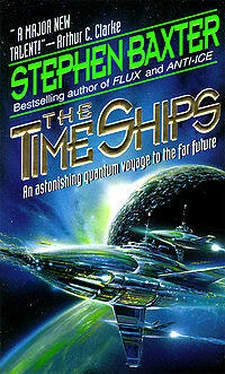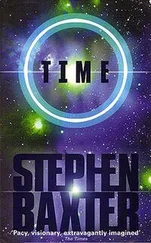I noticed that his nosegay was rather wilted, and I thought I could smell brandy on his breath. “Tell me. Is this Thursday?”
“That’s a very odd question. I ought to…”
“Yes?”
He held up the candle and peered into my face. So fascinated was he by me — by his own, dimly perceived self — that he ignored the Morlock: a man-thing from the distant future, standing not two yards away from him! I wondered if there was some clumsy Metaphor buried in this little scene: had I traveled into time, after all, only to seek out myself?
But I have no time for irony, and I felt rather embarrassed at even having framed such a Literary thought!
“It is Thursday, as it happens. Or was — we’re in Friday’s small hours now. What of it? And why don’t you know in the first place? Who are you, sir?”
“I’ll tell you who I am,” I said. “And” — indicated the Morlock, and evoked widened eyes from our reluctant host — “and who this is. And why I’m not sure what hour it is, or even what day. But first — may we come inside? For I would relish a little of your brandy.”
He stood there for perhaps half a minute, the candle wick sputtering in its pool of wax; and, in the distance, I heard the sigh of the Thames as it made its languid way through the bridges of Richmond. Then, at length, he said: “I should throw you into the street! — but…”
“I know,” I said gently. I regarded my younger self with indulgence; I have never been shy of feverish speculation, and I could imagine what wild hypotheses were already fomenting in that fecund, undisciplined mind!
He came to his decision. He stepped back from the door.
I gestured Nebogipfel forward. The Morlock’s feet, bare save for a coat of hair, padded on the hall’s parquetry floor. My younger self stared anew — Nebogipfel returned his gaze with interest — and he said: “It’s — ah — it’s late. I don’t want to get the servants up. Come on through to the dining-room; it’s probably the warmest place.”
The hall was dark, with a painted dado and a row of hat-pegs; our reluctant host’s broad skull was silhouetted by his single candle as he led the way past the door to the smoking-room. In the dining-room, there was still a glow of coals in the fireplace. Our host lit candles from the one he carried, and the room emerged into brightness, for there were a dozen or so candles in there: two in brass sticks on the mantel, with a tobacco jar plump and complacent between, and the rest in sconces.
I gazed around at this warm and comfortable room — so familiar, and yet made so different by the most subtle of rearrangements and redecoration! There was the little table at the door, with its pile of newspapers — replete, no doubt, with gloomy analyses of Mr. Disraeli’s latest pronouncements, or perhaps some dreadfully dreary stuff about the Eastern Question — and there was my armchair close to the fire, low and comfortable. But of my set of small octagonal tables, and of my incandescent lamps with their lilies of silver, there was no sign.
Our host came up to the Morlock. He leaned forward, resting his hands on his knees. “What is this? It looks like some form of ape — or a deformed child. Is this your jacket it’s wearing?”
I bridled at this tone — and surprised myself for doing so. “ ’It.’ “ I said, “is actually a ’he.’ And he can speak for himself.”
“Can it?” He swiveled his face back to Nebogipfel. “I mean, can you? Great Scott.”
He kept on staring into poor Nebogipfel’s hairy face, and I stood there on the carpet of the dining-room, trying not to betray my impatience — not to say embarrassment — at this ill-courtesy.
He remembered his hospitable duties. “Oh,” he said, “I’m sorry. Please — here. Sit down.”
Nebogipfel, swamped by my jacket, stood in the middle of, the hearth-rug. He glanced down at the floor, and then around the room. He seemed to be waiting for something — and in a moment, I understood. So used was the Morlock to the technology of his time, he was waiting for furniture to be extruded from the carpet! Although, later in our acquaintance, the Morlock was to show himself rather knowledgeable about things and flexible of mind, just then he was as baffled as I might have been had I searched for a gas mantle on the wall of some Stone Age cave.
“Nebogipfel,” I said, “these are simpler times. The forms are fixed.” I pointed to the dining-table and chairs, “You must select one of these.”
My younger self listened to this exchange with evident curiosity.
The Morlock, after a few more seconds’ hesitation, made for one of the bulkier chairs.
I got there before him. “Actually, not this one, Nebogipfel,” I said gently. “I don’t think you’d find it comfortable — it might try to give you a massage, you see, but it’s not designed for your weight…”
My host looked at me, startled.
Nebogipfel, under my guidance — I felt like a clumsy parent as I fussed about him — pulled out a simple upright and climbed up into it; he sat there with his legs dangling like some hairy child.
“How did you know about my Active Chairs?” my host demanded. “I’ve only demonstrated them to a few friends — the design isn’t even patented yet—”
I did not answer: I simply held his gaze, for long seconds. I could see that the extraordinary answer to his own question was already forming in his mind.
He broke the gaze. “Sit down,” he said to me. “Please. I’ll fetch the brandy.”
I sat with Nebogipfel — at my own transmuted dining-table, with a Morlock for company! — and I glanced around. In one corner of the dining-room, on its tripod, sat the old Gregorian telescope which I had brought from my parents’ home — a simple thing capable of delivering only cloudy images, and yet a window for me as a child into worlds of wonder in the sky, and into the intriguing marvels of physical optics. And, beyond this room, there was the dark passage to the laboratory, with the doors left carelessly open; through the passage I caught tantalizing glimpses of my workshop itself: the clutter of apparatuses on the benches, sheets of drawings laid across the floor, and various tools and appliances.
Our host rejoined us; he carried, clumsily, three glasses for brandy, and a carafe. He poured out three generous measures, and the liquor sparkled in the light of the candles. “Here,” he said. “Are you cold? Would you like the fire?”
“No,” I said, “thank you.” I raised the brandy, sniffed at it, then let it roll over my tongue.
Nebogipfel did not pick up his glass. He dipped a pallid finger into the stuff, withdrew it, and licked a drop from his fingertip. He seemed to shudder. Then, delicately, he pushed the glass away from him, as if it were full to the brim with the most noxious ale imaginable!
My host watched this curiously. Then, with an evident effort, he turned to me. “You have me at a disadvantage. I don’t know you. But you know me, it appears.”
“Yes.” I smiled. “But I’m at something of a quandary as to what to call you.”
He frowned, looking uneasy. “I don’t see why that’s any sort of a problem. My name is—”
I held up my hand; I had an inspiration. “No. I will use — if you will permit — Moses.”
He took a deep pull on his brandy, and gazed at me with genuine anger in his gray eyes. “How do you know about that?”
Moses — my hated first name, for which I had been endlessly tormented at school — and which I had kept a secret since leaving home!
“Never mind,” I said. “Your secret is safe with me.”
“Look here, I’m growing tired of these games. You turn up here with your — companion — and make all sorts of disparagements about my clothes. And I still don’t even know your name!”
Читать дальше
Конец ознакомительного отрывка
Купить книгу









